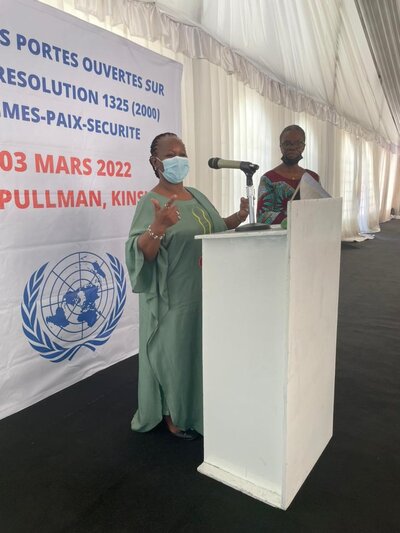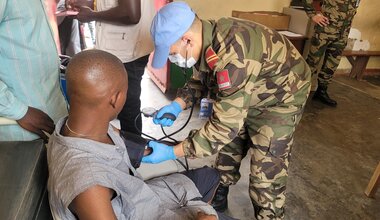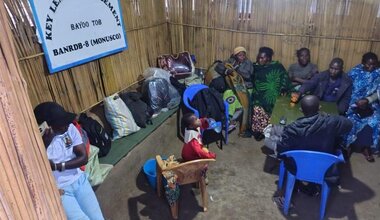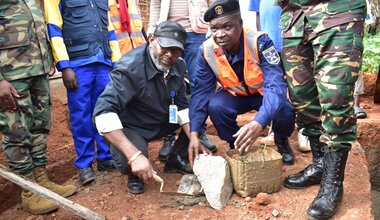DRC: Breakthrough in the Implementation of the National Action Plan in line with the UNSC Resolution 1325
Progress has been made in the implementation of the National Action Plan in line with the United Nations Security Council Resolution 1325 on women, peace and security, although further efforts are still required in compliance with the texts and commitments.
The observation was made by a hundred Congolese women, including members of the civil society organizations, national and provincial parliamentary institutions and national security forces, including the Congolese National Police (PNC) and the Armed Forces of DRC (FARDC).
These women met in Kinshasa, from March 1 to 3, 2022, on the occasion of the open houses organized around the United Nations Security Council Resolution 1325 on women, peace and security. Meetings were organized by the UN Mission in the DRC, in collaboration with UN Women.
Compliance with the texts and commitments
These meetings were an opportunity to assess the national action plan for the implementation of the resolution 1325. In her speech read out by her deputy chief of staff who represented her at this meeting, the Congolese Minister of Gender, Family and Children considered that women’s participation in decision-making bodies in the DRC has improved.
“The rate of women in government has risen to 27%. For the first time in our country, a woman has been elected Speaker of the National Assembly. Women accounts for more than 30% in the office of the National Assembly. In the finance sector, a woman for the first time has been appointed head of the Central Bank of Congo,” she said.
Gisele Ndaya Luseba also noted that "the country has a legal arsenal that promotes the participation of women in decision-making bodies". However, the participants regret that these texts are not applied. So, they urged the Congolese government to respect national and international texts and commitments to promote the participation of women in nominative and elective decision-making positions.
Fund-raising
Speaking in turn, the Minister of State in charge of Justice, Rose Mutombo, recalled that her participation in the Congolese government is the fruit of women’s advocacy through the UNSC Resolution 1325.
“And I strongly believe that the advocacy we carried out, especially as civil society organizations, has borne fruit in the DRC. I applaud the efforts made by the government and the current political authority, who nevertheless heed the voice of the women. This is why today we have been able to change the situation in relation to the statistics in our country,” she said.

For the Minister, one of the major challenges to be met remains the mobilization of funds. “Whether it is the first or the second generation of the 1325 national action plan, there is one challenge that remains, and that is the mobilization of funds. If we do not manage to mobilize the funds, this document which has been validated will remain a dead letter,” she warned.
Rose Mutombo appealed to the various partners to "support the DRC’s ambitious program that lay out in the second-generation national action plan to make it more effective".
Need for continuing to fight
Echoing the members of the Congolese government, the Special Representative of the UN Secretary General, Bintou Keita, deemed important that “the fight should continue against all forms of discrimination against women”.
“And to that end, we have to work with young people, students, journalists and national security forces; but at the same time, when women are underrepresented, we must ensure that we have appropriate mechanisms that allow them to be protected,” she said.
The Head of MONUSCO clearly referred to an ongoing investigation by the Mission's Political Affairs Division into the physical, symbolic, moral, and other forms of violence women face when participating in the political process in the DRC.
"We hope this study will be achieved in time and will hopefully ensure that we are fully aware of the security and protection needs for women candidates and the elected women for the upcoming electoral process of the 2023", she said.
Bintou Keita also welcomed the progress made in the prevention and protection of women against sexual and gender-based violence and the fight against impunity.
“I see sanctions being applied. Unfortunately, this is not relayed when they are taken. We only see the side where impunity is very high. But where there are punishments, I think you must relay them because that's how it would encourage us to say that there is progress,” she explained.
Finally, the representative of the UN Women in the DRC, Adama Moussa, considered that the resolution 1325 is among the most compelling ones "because, to put it quite simply, it is one of the most owned by all actors, one of the most popularized and with a regular accountability mechanism”.
Recalling that "all lasting solutions to the various conflicts necessarily go through the effective involvement of women", he encouraged the actors in this sector to "keep up the dynamic".
Mr. Moussa finally reaffirmed the solemn commitment of the organization he heads to support this entire process.

 UN
UN United Nations Peacekeeping
United Nations Peacekeeping






